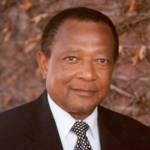 As the leader of the National Medical Association, I have the responsibility to provide a perspective to our constituents on key issues in Medicine that are important to us and to the patients whom we serve. One of those issues is TRUST, which has special meaning to people who have been subjected to so many abuses and indignities over the past 400 years. In the tradition and in memory of the late legendary Howard University School of Medicine professor, civil rights activist, former NAACP president, past president of the National Medical Association, philosopher, and my personal mentor and hero, W. Montague Cobb, MD, Ph.D, who was also Editor Emeritus of this Journal, I submit the following perspective on this topic, which will be incorporated into my forthcoming book, Blacks in Medicine: Clinical, Demographic, and Socioeconomic Correlations (Springer Science & Media, 2017).
As the leader of the National Medical Association, I have the responsibility to provide a perspective to our constituents on key issues in Medicine that are important to us and to the patients whom we serve. One of those issues is TRUST, which has special meaning to people who have been subjected to so many abuses and indignities over the past 400 years. In the tradition and in memory of the late legendary Howard University School of Medicine professor, civil rights activist, former NAACP president, past president of the National Medical Association, philosopher, and my personal mentor and hero, W. Montague Cobb, MD, Ph.D, who was also Editor Emeritus of this Journal, I submit the following perspective on this topic, which will be incorporated into my forthcoming book, Blacks in Medicine: Clinical, Demographic, and Socioeconomic Correlations (Springer Science & Media, 2017).
III. Maintaining Trust
The first point of contact for the patient with the doctor is the office. How the patient is initially received at the office is pivotal in the establishment of a smooth and congenial doctor-patient relationship, and of course this contact usually occurs before the two meet. When the patient walks in the door and goes up to the receptionist, that person must be cordial, well-dressed, and eager to help. The receptionist as well as the rest of the office staff should greet the patient and should think of themselves as an extension of the physician in all of their dealings with the patient. Their behavior should be professional but compassionate at all times, and courtesy must be a hallmark of their attitude. They should become experts in interpersonal relations and must make each patient feel special. Needless to say, they must emphasize and demonstrate that the patient’s medical affairs are strictly confidential (now mandated by law by the HIPAA regulations).
These elements have to be repeated each time the patient visits as well as when the patient is contacted for results of laboratory tests, etc. between visits. Appropriate handling of these elements will serve to strengthen the trust which the patient has built up and will help immeasurably in maintaining it. The doctor must be responsible for how his office staff manages the patient, and he must be the person designated to initiate and oversee their function, along with the office manager or medical assistant.
The doctor himself, therefore, is the key to maintaining the trust that has been instilled in the patient. In addition to motivating his staff, he must maintain a code of cultural competence at all times in dealing with patients. This means always regarding the patient as the center of the medical universe rather than himself, and manifesting a humane approach to the treatment of the patient. This does not have to be time-consuming.
It is more a matter of showing a positive attitude during brief encounters with the patient rather than spending lengthy periods discussing medical matters. It is also important to show respect for the patient’s intelligence and point of view, as well as for his family’s wishes. Above all, the doctor must be sure to explain to the patient how he plans to treat the illness, the likely consequences of that treatment, and the importance of being compliant with the medication which the physician has judiciously chosen.
Many times, trust which has been established breaks down. We will now analyze the reasons for this.
IV. Losing Trust
Although the patient may not express it verbally, he or she may lose trust in the doctor. It is difficult to determine in every instance why this occurs, but the symptoms and signs may be apparent. The best example of a loss of trust is when the patient stops coming to the doctor. This is an overt signal that something is wrong and needs to be followed up. Often it is caused by a breakdown of those principles mentioned above on building and maintaining trust. Perhaps the office staff did something which the patient felt was embarrassing or demeaning, and rather than facing the staff again, the patient decides not to return.
Or perhaps it was something that the doctor did or did not do, such as not explaining to a young black male with hypertension that the powerful anti-hypertensive medications which he is taking may cause him to experience sexual dysfunction. These are elements which can destroy the faith and trust that were painstakingly constructed, which leads to a situation potentially harmful to the patient from not taking his prescribed medications, and diminishes the doctor’s status in the eyes of the patient.
Through efforts by his office staff, the doctor should strive to maintain contact with the patient between visits. Reminders should be mailed to the patient about upcoming appointments, and when the patient fails to show up for an appointment, the office should make contact and urge the patient to reschedule. Such an indication of interest on the part of the doctor will engender a sense of trust in the patient and will help to avoid the loss of trust.
V. Summary
Judging from the material that has been presented above, it is evident that matters of trust are extremely significant in establishing and maintaining a good doctor-patient relationship. In addition, if the principles underlying trust are followed, this should have a huge impact on healthcare disparities and cultural competency.
In the end analysis, we can positively affect the outcomes of our medical interventions simply by treating all patients equally well. This will help to fulfill the tremendous promise which our healthcare system can and should provide, especially to those who are most in need. In addition, inclusion of minorities in clinical trials is very important, and establishing trust in the medical system is fundamental to doing this. There is no doubt that the doctor is the key to its success.
 Richard Allen Williams, MD, FACC, FAHA, FACP is Clinical Professor of Medicine, UCLA School of Medicine, President/CEO, The Minority Health Institute, Inc., Founder, Association of Black Cardiologists Los Angeles, California and the 117th President, National Medical Association.
Richard Allen Williams, MD, FACC, FAHA, FACP is Clinical Professor of Medicine, UCLA School of Medicine, President/CEO, The Minority Health Institute, Inc., Founder, Association of Black Cardiologists Los Angeles, California and the 117th President, National Medical Association.









